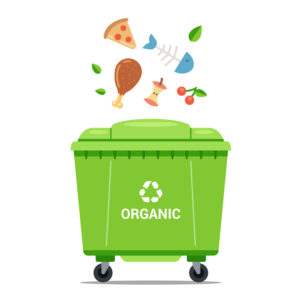Food waste is an international crisis. In the U.S. alone, an estimated 52 million tons of food end up in landfills each year. That’s a devastating statistic considering how many Americans go to bed hungry each night, but the problems with food waste go beyond hunger. Improperly handling food waste has financial, environmental and legal consequences, too.
 While you might not have the power to end food waste, you can do your part to reduce its negative impact by adopting good disposal practices for organic waste. If your business produces or works with food in any way, there’s no time to waste – and making significant change is easier than you might think.
While you might not have the power to end food waste, you can do your part to reduce its negative impact by adopting good disposal practices for organic waste. If your business produces or works with food in any way, there’s no time to waste – and making significant change is easier than you might think.
It Could Save You Money
Want to control costs? Watch where your food waste is going. Proper commercial food waste disposal has been shown to have dramatic financial benefits for some businesses.
Research released in 2017, done on behalf of food-waste-prevention coalition Champions 12.3, analyzed data from about 1,200 business sites in 17 countries. The businesses that were included represented a range of food-related industries, from food manufacturers to hospitality and grocery stores. Researchers found that 99 percent of the sites saw a positive return on investments made to reduce food waste. Across all sites they calculated the median benefit-cost ratio to be 14:1 – meaning that for every $1 spent on reducing food loss and food waste, the average business saved $14. Companies saved money in several ways, including by finding ways to sell food that would otherwise be wasted and by reducing waste management costs.
How much you’ll be able to save by committing to proper food waste disposal really varies on how much you’re generating and what disposal policies you currently have in place. Any efforts you make around food waste management may pay off in unforeseen ways later on, though. This issue is currently of great importance to a lot of people. Someday your commitment to responsible food waste policies could help you win new business or boost your reputation in the eyes of influential community members.
Also, if your business is required by law to follow certain commercial food waste disposal policies, improper disposal puts you at risk of being fined for noncompliance – more on that below.
It Protects the Environment
Food dumped in landfills isn’t just wasted. It’s damaging to our environment, too. Decomposing organic waste generates methane, a dangerous greenhouse gas. (It’s significantly more potent than carbon dioxide.) All of the energy and resources that went into producing and shipping the food are also wasted. An estimated 11 percent of greenhouse gas emissions generated by the food industry are attributed to wasted food. Proper commercial food waste disposal practices keep organic waste out of landfills, preventing the production of those damaging greenhouse gases.
It’s (Maybe) a Matter of Law
Depending on where your business operates, your commercial food waste disposal practices may be governed by local law. In Massachusetts, businesses that dispose of at least one ton of commercial organic waste per week are prohibited from disposing of it via landfills. These businesses are required by law to instead use composting, conversion, recycling or reuse to get rid of such waste. The ban was implemented by the Massachusetts Department of Environmental Protection on October 1, 2014, part of the agency’s plan to divert at least 35 percent of all statewide food waste by 2020.
The disposal ban has its critics, but a 2016 analysis of the waste ban concluded that it had supported more than 900 jobs and generated about $175 million in economic activity for Massachusetts, less than two years after the ban was first put into place. As of 2017, 280,000 tons of food had been diverted rather than landfilled.
It’s Easier Than You Think
Maybe you’ve always wanted to improve your organization’s food waste disposal practices, but you don’t know how to do it. There are a variety of options available in many communities, in part due to the increased attention around organic waste disposal in recent years. In Massachusetts, composting has become the most common fate for diverted food waste. As of 2017, 150,000 tons of waste had been composted. Another 88,000 tons were sent to anaerobic digestion facilities, where the waste could be converted to energy.
It doesn’t have to fall to you as a business owner to figure out the best way to approach commercial food waste disposal. You’re busy enough as it is. All you need is the motivation to change your business’s food waste disposal practices. Miller Recycling will help with the rest. We’ll make a site visit to evaluate your needs and design a cost-effective plan that will allow you to give your food waste new life.
Are you confident that you’re making the right choices around disposing of your business’s food waste? If not, don’t be daunted about making changes. Miller Recycling can help you put your food waste to work. Contact us today to learn more.

